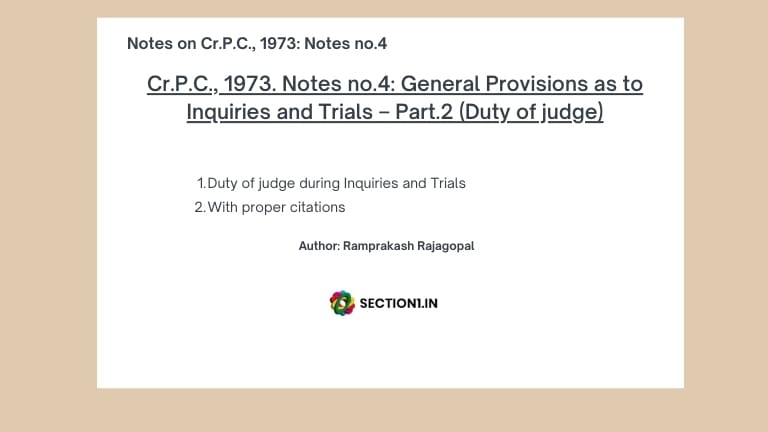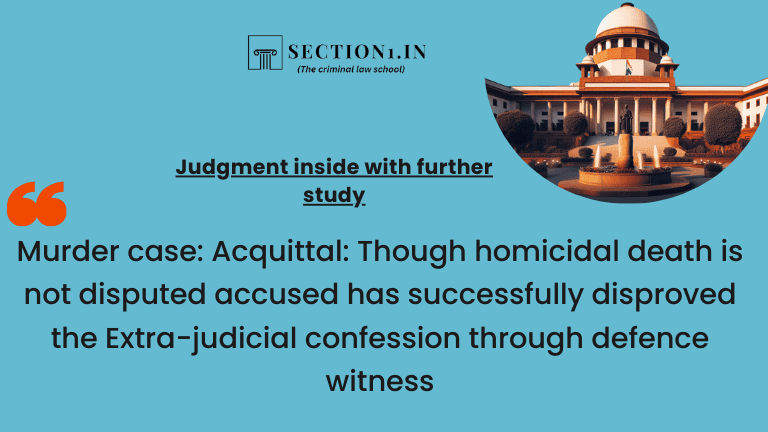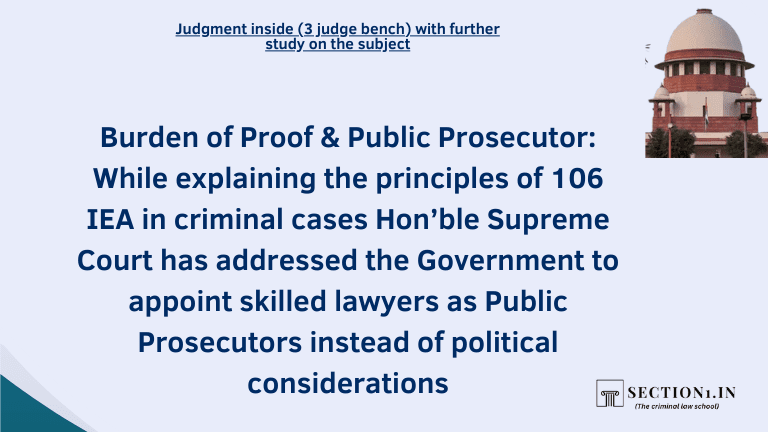Duty of Judge: Towards accused
A judge must be of sterner staff. His mental equipoise must always remain firm and undefeated. It is essential that a judge should not allow his personal. It prejudice to go into the decision making as was remarked by Scrulton.L.J in R. vs. Bath Compensation Authority[1]. Further Supreme Court has held that a closed mind is antithetical to fair hearing. Prejudice tends to corrupt the ability to exercise independent judgment. It has a tendency to intend upon a free mind and may influence the outcome[2].
Duty of Judge: Judge cannot question the accused
But the question for consideration is that when the power is sought be invoked where the Magistrate by virtue of the specific provisions of the statute is enabled to find a prima facie case by reference to unprovable, untested and possibly inadmissible documents on which the prosecution proposes to rely, whether to such a case those considerations necessarily apply. If without evidence, properly so called, a Magistrate examines an accused he would be converting him into an Investigation Agency and there is therefore every possibility of the accused being prejudiced and that might be the very reason why the sub-section has been framed, in a manner to avoid this result[3].
Duty of Judge: During trial
A Judge does not preside over a criminal trial merely to see that no innocent man is punished. A Judge also presides to see that a guilty man does not escape. One is as important as the other. Both are public duties which the Judge has to perform[4]. Acquittal of an accused who has committed the crime causes grave injustice in the same manner as that of conviction of an accused[5]. After all, function of the criminal Court is administration of criminal justice and not to count errors committed by the parties or to find out and declare who among the parties performed better[6].
Duty of Judge: Accused may sit
It is not right or proper that the accused were not provided with a sitting place during the trial, which has gone on for the past seven months. We direct that the learned Sessions Judge will permit the accused to sit down during the trial. In fact, we are unable to understand how any Court in our country can at all insist that the accused shall keep on standing during the trial, particularly. When the trial is long and arduous this case. We hope that all the High Courts in India will, take appropriate steps, if they have not already done so, to provide in their respective Criminal Manuals prepared under S. 477 (1) of the Criminal P. C. that the accused shall be permitted to sit down during the trial unless it becomes necessary for the accused to stand up for any specific purpose, as for example, for the purpose of identification. We need not add that the facility to be accorded to the accused for sitting down during the trial should not be construed as in derogation of the established convention of our Court that everyone concerned should stand when the Presiding. Officer enters the Court[7].
Duty of Judge: Secure the presence of Investigation Officer
It was the duty of the Sessions Judge to issue summons to the investigating officer if he failed to remain present at the time of trial of the case. The presence of investigating officer at the time of trial is must. It is his duty to keep the witnesses present. If there is failure on part of any witness to remain present, it is the duty of the Court to take appropriate action including issuance of bailable/non-bailable warrants as the case may be. It should be well understood that prosecution cannot be frustrated by such methods and victims of the crime cannot be left in lurch[8].
Duty of Judge: Ensure the presence of witness by witness warrant
The Full Bench of this court[9] has specifically held in the said decision that the Judicial Magistrate should take coercive steps for ensuring the production of the important witnesses. The learned Judicial Magistrate, in the present case, would simply say that several reminders have been sent for service of summons, but the police were not diligent. There is nothing on record to show that coercive steps such as issuing of warrants were taken by the trial court. As such, the Judicial Magistrate has committed a serious illegality. Under those circumstances, it would be appropriate to set aside the order of acquittal and remand it for a fresh de novo trial to the trial court. Accordingly, the matter is remitted back to the trial court[10].
-
In view of the dictum laid by one Madras High Court the learned Magistrate in this case ought to have taken coercive steps, and he did not do so, and in those circumstances I am of the view that the order of acquittal passed by the learned trial Magistrate cannot be sustained, and it has to be set aside[11].
-
Prosecution delaying the trial by adjournments and not taking steps to examine the witnesses. Negligence of prosecution. In that circumstances denial of adjournment affirmed[12].
-
The language in the summons makes it abundantly clear that the witness has to necessarily obey the summons. Even thereafter in spite of the same, if the witness does not turn up, or conceals himself to avoid the service of the said warrant, proclamation requiring the attendance of the witnesses by way of Form-5 can be issued by the Magistrate. The Magistrate shall also in addition to the above, issue order of attachment, to compel the attendance of the witness under Form No. 6[13].
-
On a scrutiny of the orders passed by the learned trial Judge from time to time, we find that the learned trial Judge has really not taken pains to verify whether the summons had really been served on the witnesses or not. The High Court has rightly observed that the trial court has also not tried to verify from the record whether the warrants had been executed or not. As is manifest, he had directed the prosecution to produce the witnesses and mechanically recorded that the witnesses were not present and proceeded to direct the prosecution to keep them present[14].
-
The presence of investigating officer at the time of trial is must. It is his duty to keep the witnesses present. If there is failure on part of any witness to remain present, it is the duty of the Court to take appropriate action including issuance of bailable/non-bailable warrants as the case may be. It should be well understood that prosecution cannot be frustrated by such methods and victims of the crime cannot be left in lurch[15].
Duty of Judge: Coercive methods to secure the presence of witness
A conspectus of the relevant provisions of The Criminal Procedure code, The Evidence Act and The Criminal Rules of Practice, would only go to show that the witnesses have no right to abstain themselves from appearing in Court and giving evidence. However, they are at liberty to depose or give evidence on their conscience and oath. Further, Madras High Court has held that the language in the summons makes it abundantly clear that the witness has to necessarily obey the summons. Even thereafter in spite of the same, if the witness does not turn up, or conceals himself to avoid the service of the said warrant, proclamation requiring the attendance of the witnesses by way of Form-5 can be issued by the Magistrate. The Magistrate shall also in addition to the above, issue order of attachment, to compel the attendance of the witness under Form No. 6[16].
Duty of judge: Witness turned hostile – Judge shall not threaten the witness
When a witness whose statement u/ss 161 or 164 Cr.P.C was recorded was not sticking to his statement so recorded, the Court should not rebuke him nor threaten him that he shall be prosecuted of perjury[17].
If the contention of the petitioner is accepted, then there is likelihood of Sessions case getting prolonged indefinitely. Moreover, the commission of offence for perjury to misguide the Court will be unearthed only at the end of the trial. It is not the real spirit of the legislature that each and every witness, who turns hostile or gives different versions, has to be punished under the penal provisions of law. In case the submission of the petitioner is accepted, there is every possibility of the accused coming forward with the similar petition and in that event, there could be no finality attained in the real issue and there will certainly be a total chaos and confusion in the administration of the justice. As held by the Hon’ble Supreme Court, only after the final verdict, action could be initiated against the witnesses, who give false statements during Trial and therefore, I find that there is no substance in the contention raised by the petitioner[18].
Duty of judge: Examination of witnesses – Absence of accused – Boycott
In the result, we hold that the learned single Judge’s order in S.Yuvaraj vs. State [2013 (4) MLJ (Crl.) 314] cannot be misconstrued as laying down the law that, trial Courts cannot record the examination-in-chief of witnesses who are in attendance, in the absence of defence counsel, even when there is boycott of Courts. We leave these aspects to the best discretion of the trial Court Judges, who, we are confident, will bear in mind the rights of the accused and the victim and would use their discretion judiciously. We also cannot lose sight of the fact that Advocates of both sexes, become victims of crime and when they come to the Court for giving evidence for the prosecution, can the Judge send them away on the score that the defence counsel is not present? The answer is an emphatic ‘No’. What applies to lawyers should apply to others too. If a Judge records evidence in chief even without ascertaining whether the accused had engaged a counsel or not, then the issue takes a different form and the trial Court can be faulted if it is found that the accused had not even engaged a counsel[19].
Further reading
Cr.P.C., 1973. Notes no.2: A General Introduction (with powers of police)
Cr.P.C., 1973. Notes no.3: General Provisions as to Inquiries and Trials – Part.1
[1] (1925)1K.B, 635, 719(C.A)
[2] Mangilal and Ors vs. State of M.P – 1995(1) MWN (Crl) 137 (SC)
[3] Ramnarayan mor and another vs. The State of Maharashtra – AIR 1964 SC 949=(1964)5 SCR 1064=(1964)2 Cr.L.J 44(SC) (5 Judge Bench)
[4]State of U.P. v. Anil Singh, AIR 1988 SC 1998 : (1989 Cri LJ 88)
[5] State of Maharashtra vs. Lahu @ LahuKumar – (2013)10 SCC 292=(2014)1 SCC (Cri) 395
[6]AIR 1999 SC 2292 : 1999 AIR SCW 2356 : 1999 Cr.L.J 3529 (SC) – Rajendra Prasad v. Narcotic Cell
[7]AIR 1982 SUPREME COURT 1260 “Avtar Singh v. State of M.P.”
[8]AIR 2002 SUPREME COURT 270 “Shailendra Kumar v. State of Bihar”= 2001 AIR SCW 4984 [3 judges].
[9] State vs. Veerappan – 1980 L.W (Cri) 187 (FB)
[10] Navasakthi vs. State – (2002)1 MLJ (Cri) 291
[11] P.Vincent vs. Balupillai and 2 Others – 1998-2-LW (Crl) 480
[12]State of Vishwanath Lughani – 1981 Cr.L.J 745 (SC)=AIR 1981 SC 1239=1982 SCC (Cri) 139
[13] Tmt. Vijayalakshmi Viswanathan … vs S. Soundara Pandian – 2003 (3) CTC 33=2003 (1) MLJ(Crl) 840
[14] BABLU KUMAR AND OTHERS vs STATE OF BIHAR AND OTHERS – (2015) 8 SCALE 53 : (2015) 8 SCC 787 : (2015) 3 SCC(Cri) 862.
[15] Shailendra Kumar VS State Of Bihar – 2001 8 Scale 320; 2002 1 SCC 655; 2002 0 SCC(Cri) 230.
[16] SMT. VIJAYALAKSHMI VISWANATHAN vs. S. SOUNDARA PANDIAN AND M. PERIYASAMY – (2003) 4 Crimes 131=(2003) 3 CTC 33.
[17] Ramchander & Ors vs. State of Haryana – AIR 1981 SC 1036.
[18] Sundari Annadurai vs The Principal Secretary, Home Department (Courts) And Others – Criminal O.P.(MD) No. 7331 of 2015 Decided on : 10-12-2015.
[19] S. Yuvaraj Versus State through Inspector of Police, Gopichettipalayam PS., Erode District – 2014 (6) CTC 653=2014 (3) MWN(Cr) 398=2015 (1) LW(Crl) 55 (Mad-DB)






